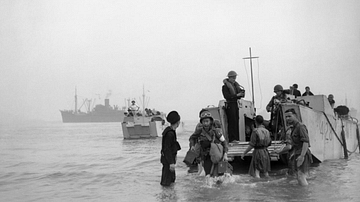Search
Did you mean: Easter?
Search Results

Definition
Second Crusade
The Second Crusade (1147-1149) was a military campaign organised by the Pope and European nobles to recapture the city of Edessa in Mesopotamia which had fallen in 1144 to the Muslim Seljuk Turks. Despite an army of 60,000 and the presence...

Definition
Carolingian Dynasty
The Carolingian Dynasty (751-887) was a family of Frankish nobles who ruled Francia and its successor kingdoms in Western and Central Europe during the Early Middle Ages. The dynasty expanded from Francia as far as modern Italy, Spain, and...

Definition
Mauretania
Mauretania was an ancient kingdom in northwest Africa, encompassing regions of modern-day Morocco and Algeria. Although it shares a name with the modern country of Mauritania, they do not overlap. Ancient Mauretania was named after the Mauri...

Definition
Operation Torch
Operation Torch (aka the North Africa landings) landed Allied troops in French Morocco and Algeria on 8 November 1942 with the aim of removing German and Italian forces from North Africa. The first jointly-planned Allied operation of the...

Article
Eyewitness Accounts of WWI
The First World War (1914-18) was the first truly global conflict and the first to be fully mechanised. Armies clashed across continents on land, in the air, and at sea. Civilians were caught up in the destruction as never before. In this...

Article
Battle of Bir Hakeim - The Heroic Defence by Free French Forces in Libya
The defence by Free French forces of the remote desert watering hole of Bir Hakeim (Hacheim) in Libya, North Africa in May-June 1942 during the Second World War (1939-45) is one of the most heroic episodes in French military history. Although...

Article
Viking Age Greenland
Greenland was drawn into the Viking Age and settled by Norse Vikings in the late 980s CE, their presence there lasting into the 15th century CE. Despite its ice-riddled geography, the Norse managed to carve out a living for themselves in...

Article
North Africa’s Place in the Mediterranean Economy of Late Antiquity
The Mediterranean Sea was the economic focal point of the Roman Empire. Rome's armies first established an empire across these waters beginning back in the times of the Roman Republic. In 200 CE, the Mediterranean was still the channel that...

Definition
Diocletian
Diocletian was Roman emperor from 284 to 305 CE. After the defeat and death of the Roman emperor Philip the Arab in 249 CE, the empire endured over three decades of ineffective rulers. The glory days of Augustus, Vespasian, and Trajan were...

Definition
Afrika Korps - Germany's Elite Desert Force
The Deutsches Afrika Korps (DAK) was an elite German armoured unit that fought in North Africa during the Second World War (1939-45). The Korps was initially led by Erwin Rommel (1891-1944) before he was promoted to lead a larger force of...